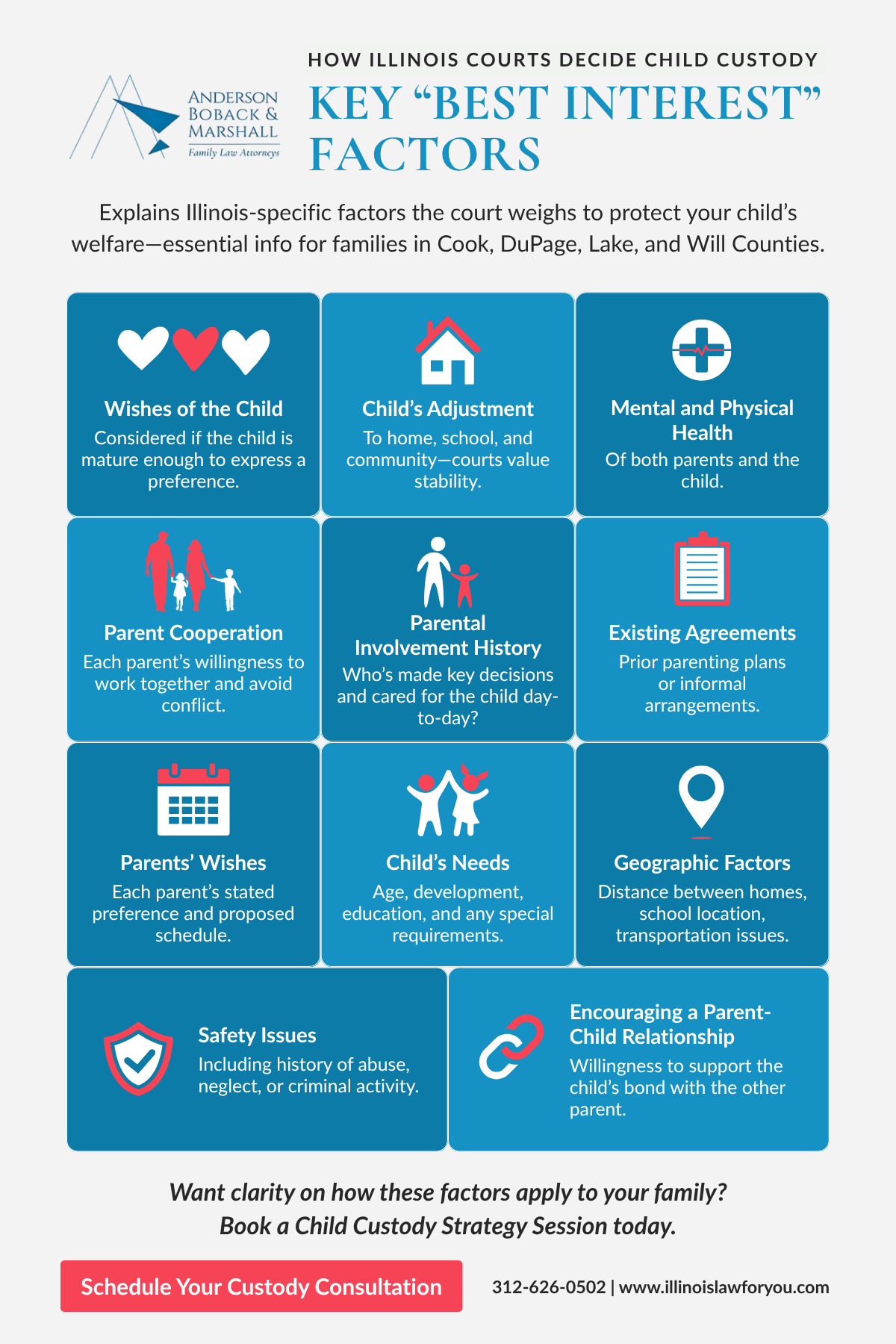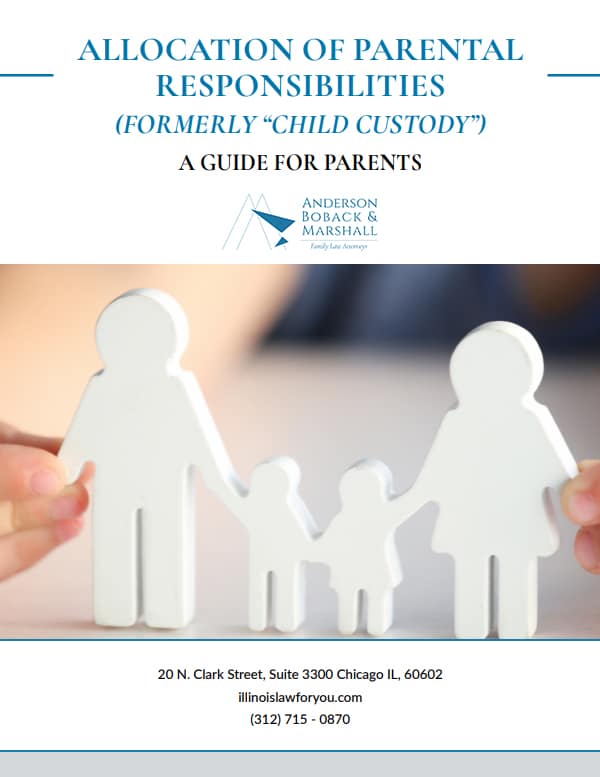In divorce and parentage cases, “the best interest of the child” is a phrase often thrown around by judges and lawyers. But what does it mean? The phrase sounds like it is vague and easy to cross standards. Still, the courts use a specific list of factors in the Illinois Marriage and Dissolution of Marriage Act statute to determine what serves a child’s best interests. The courts will then use this to decide how to allocate parental responsibilities, commonly known as “custody.”
What are “the Best Interest of the Child” Factors?
In Illinois, the following factors are what the court considers to determine a child’s best interests, as applicable in each case:
- The wishes of the child;
- The child’s adjustment to their home;
- The mental and physical health of all involved;
- The wishes of the parent;
- The child’s needs and the ability of the parents to put the child’s needs ahead of their own;
- The distance between the parents and the effect on the daily schedule of the child;
- The willingness of the parents to help foster healthy relationships between the other parent and the child;
- Violence or threats of violence against the child or other household members;
- Any abuse against the child or other household members;
- If one party is a sex offender and the nature of the offense, and,
- Any other relevant factor.
Factors that are Not Considered When Determining a Child’s Best Interest
Several factors should not be considered when determining the best interest of a minor child because courts have decided that they are irrelevant and are often used to shame the other parent. These factors include:
- Past marital misconduct (i.e., cheating, alcohol, drugs, etc.) is only applicable if it would directly affect the child;
- The income of the parents;
- Race; and,
- Religion.
When Does the Court Use “The Best Interest of the Child” Factors?
The factors used to determine the best interests of a child applies in any Illinois family law case where there is a question about the child’s allocation of parental responsibilities or a parenting time schedule – or commonly referred to as custody issues.
While most people might consider parental responsibility as custody, Illinois does not discuss parenting using those terms. Instead, Illinois divides “custody” into two parts:
- parental decision-making, and
- parenting time.
Parental decision-making is the responsibility of each parent to make major decisions for their child. These decisions include major issues relative to a child’s medical care, education, religion and extracurricular activities.
Parenting time is when each parent has time with the children, including school breaks and holidays, and when the parent has control over the general day-to-day care of the minor child.
Each one of the factors is weighed against the other and can be used to determine the child’s best interest and whether it would be best if there was joint decision-making amongst both parents, or sole decision-making, for each item allocated to one specific parent.
For example, a court would be less likely to give joint decision-making if one parent with a history of ignoring the child’s medical needs. The court would likely also weigh this, amongst the other factors, when determining a parenting time schedule. The general goal is to foster the best relationship between the child and both parents. The court would be less willing to grant a substantial amount of parenting time, or any time at all, to a parent who has a history of trying to ruin the relationship between the child and the other parent.
Can We Decide on Parenting Time and Parental Responsibility on Our Own?
If you wish to resolve parenting issues before filing, then mediation can be used to discuss many of these issues and can be used to constructively come up with a plan. Co-parenting therapy is another tool that can be utilized to work together and prevent the divorce from becoming contentious, similar to mediation.
After a custody case is filed, if attorneys are already involved, mediation will be required so long as there are no impediments to mediation, such as the issuance of an order of protection. In mediation, a mediator will listen to both parents and their concerns and help them work together to resolve their parenting time and allocation of parental responsibility issues. The parties work together to try and come to the best possible solution. Ultimately though, the goal of mediation is to find common ground and resolve issues between the parties. Still, there isn’t a specific reliance upon the best interest factors in that process. However, often both parents reaching common ground and coming to an agreement will ultimately result in agreements that serve the child’s best interests.
What if We Cannot Come to a Parenting Agreement on Our Own?
If the parties disagree, the court may appoint a Guardian Ad Litem (GAL) or a Child Representative. A GAL is an attorney trained to investigate and make recommendations in the best interest of the child. They may testify at a trial. A Child Representative is an attorney appointed to represent the minor child’s best interests. They act as an attorney acting on behalf of what they believe serves the children’s best interests at a hearing or trial, as opposed to a GAL, who acts as a witness for the Court and testifies.
After the appointment, the GAL will investigate the child’s home life and living situation and conduct interviews with the parents, the child, and other collateral witnesses involved in the child’s life (i.e., teachers, doctors, grandparents, etc.).
From the interviews and investigations, the GAL will issue a report, detailing their specific investigation as to all factors which serve the best interests of the child. The Court often takes the GAL’s recommendations under heavy consideration unless there is a conflicting expert report such as that of a 604.10(b) Custody Evaluator.
The parties’ attorneys have the opportunity at a hearing to examine and cross examine the GAL regarding their report. A subpoena may also be issued to depose the GAL.
Schedule a Consultation with a Chicago Child Custody Lawyer
When it comes to matters of child custody or the allocation of parental responsibilities or parenting time, it is important to seek advice and input from an experienced, trusted child custody lawyer in Chicago. Contact Anderson Boback & Marshall today when you’re faced with questions about the best interest factors for your child.
















